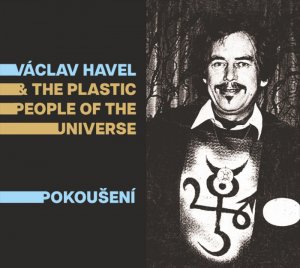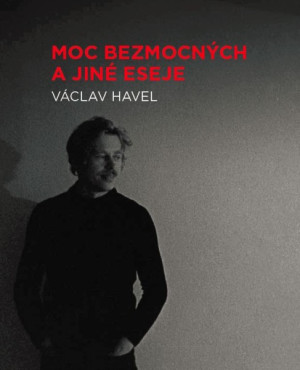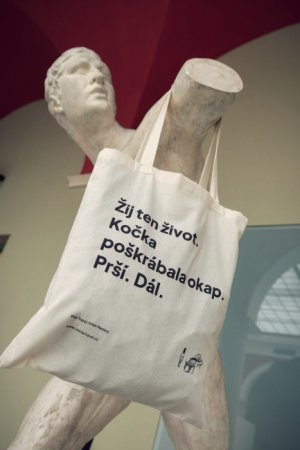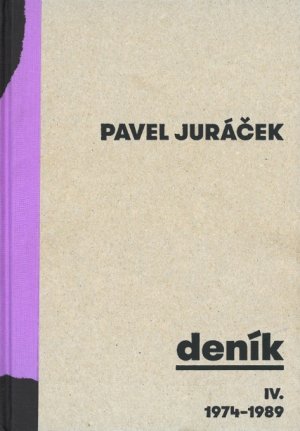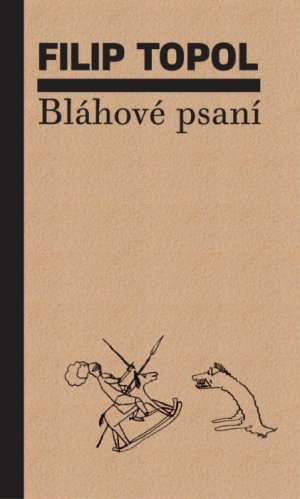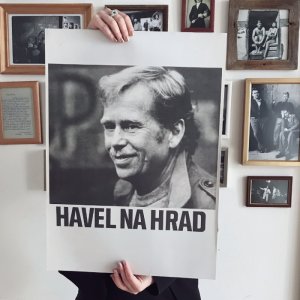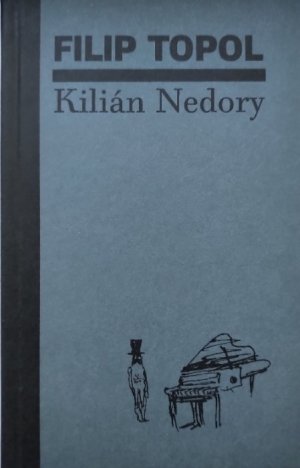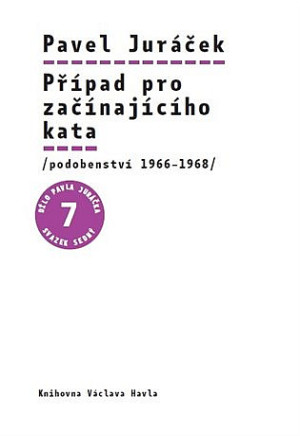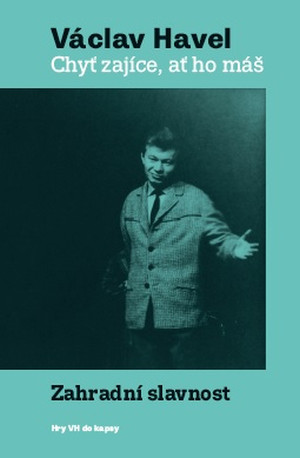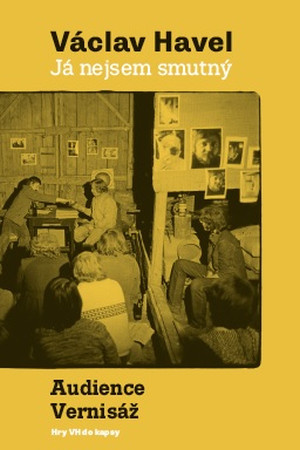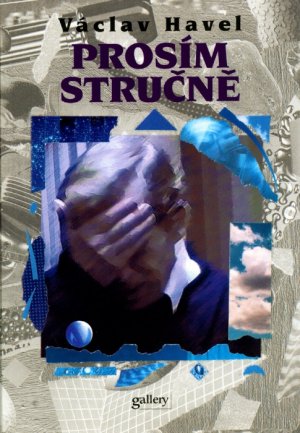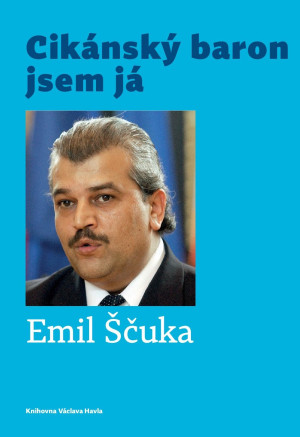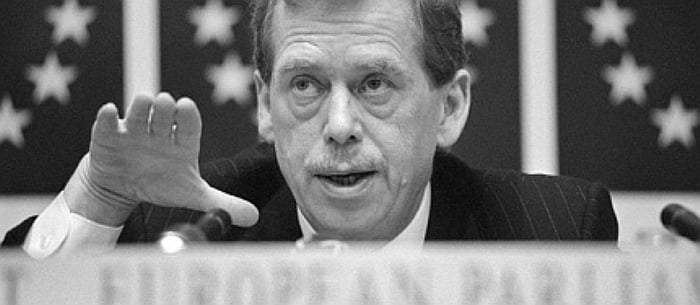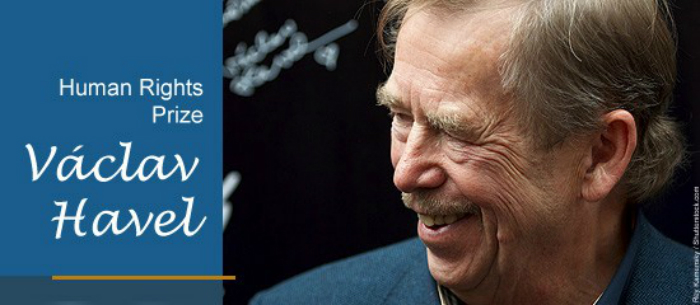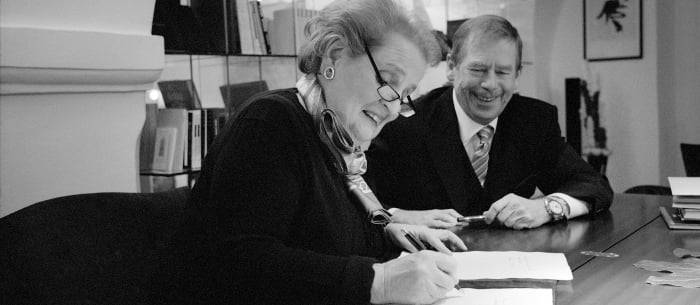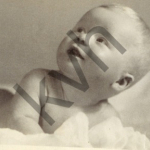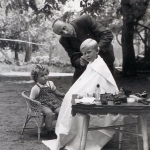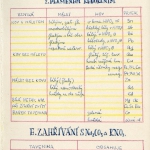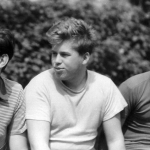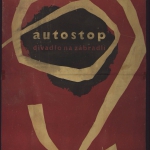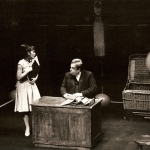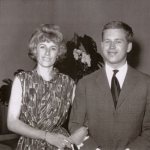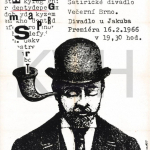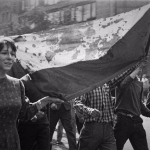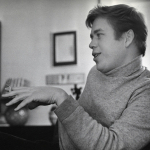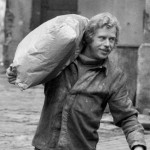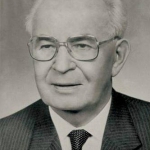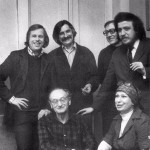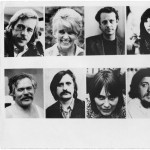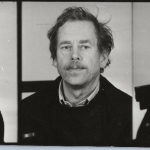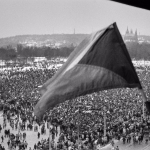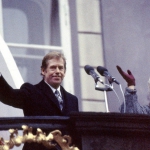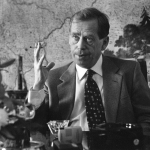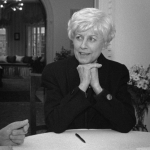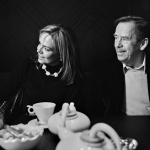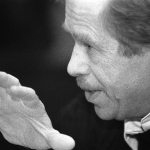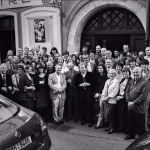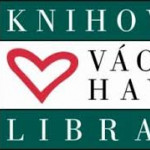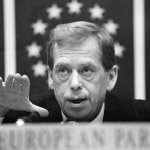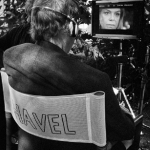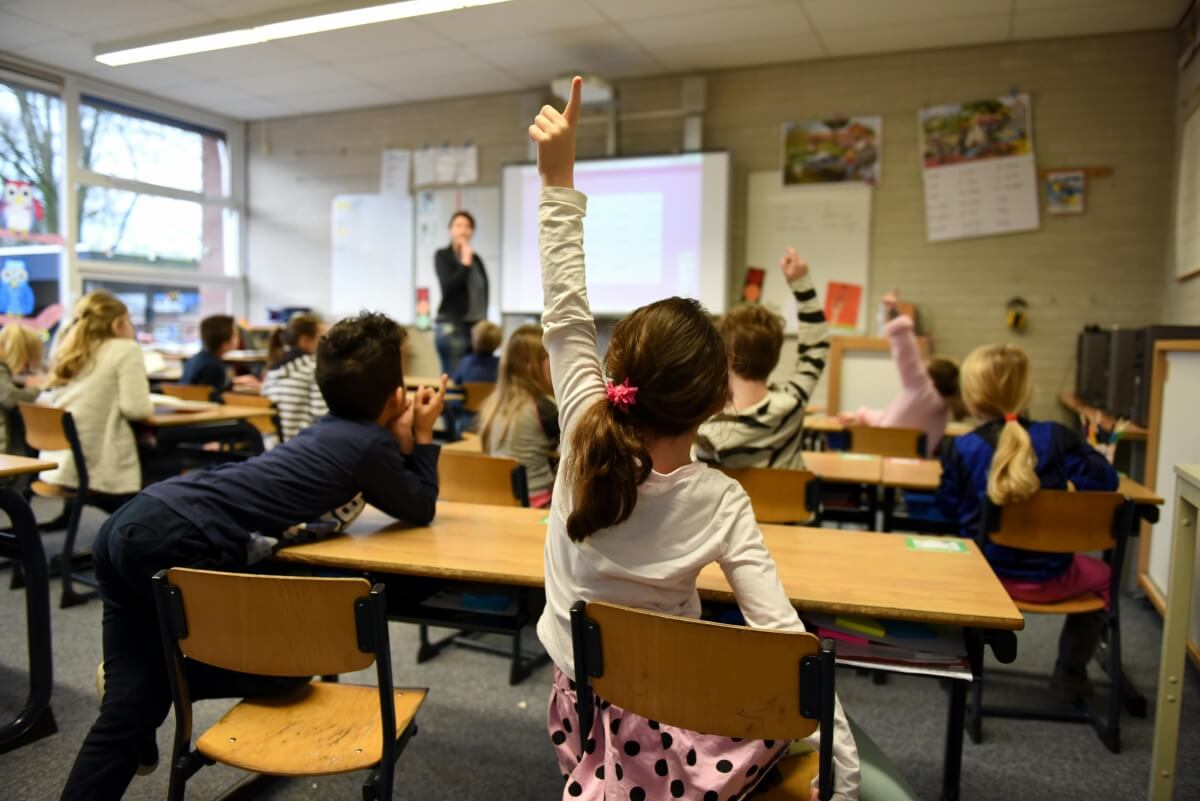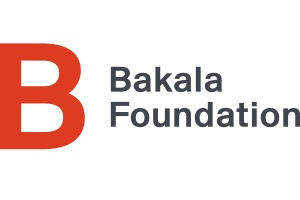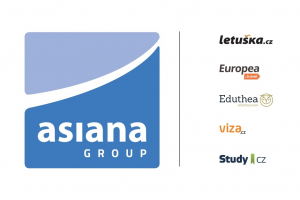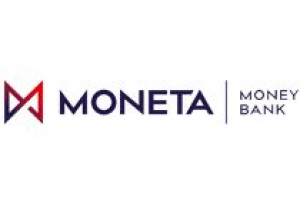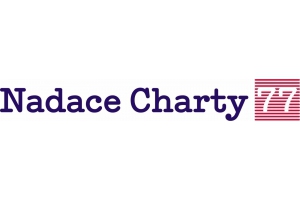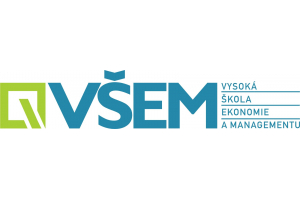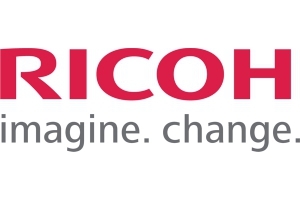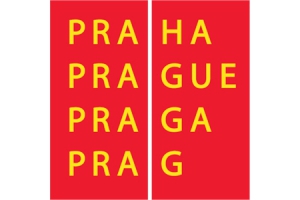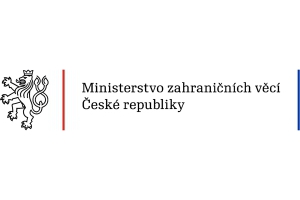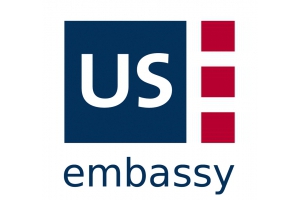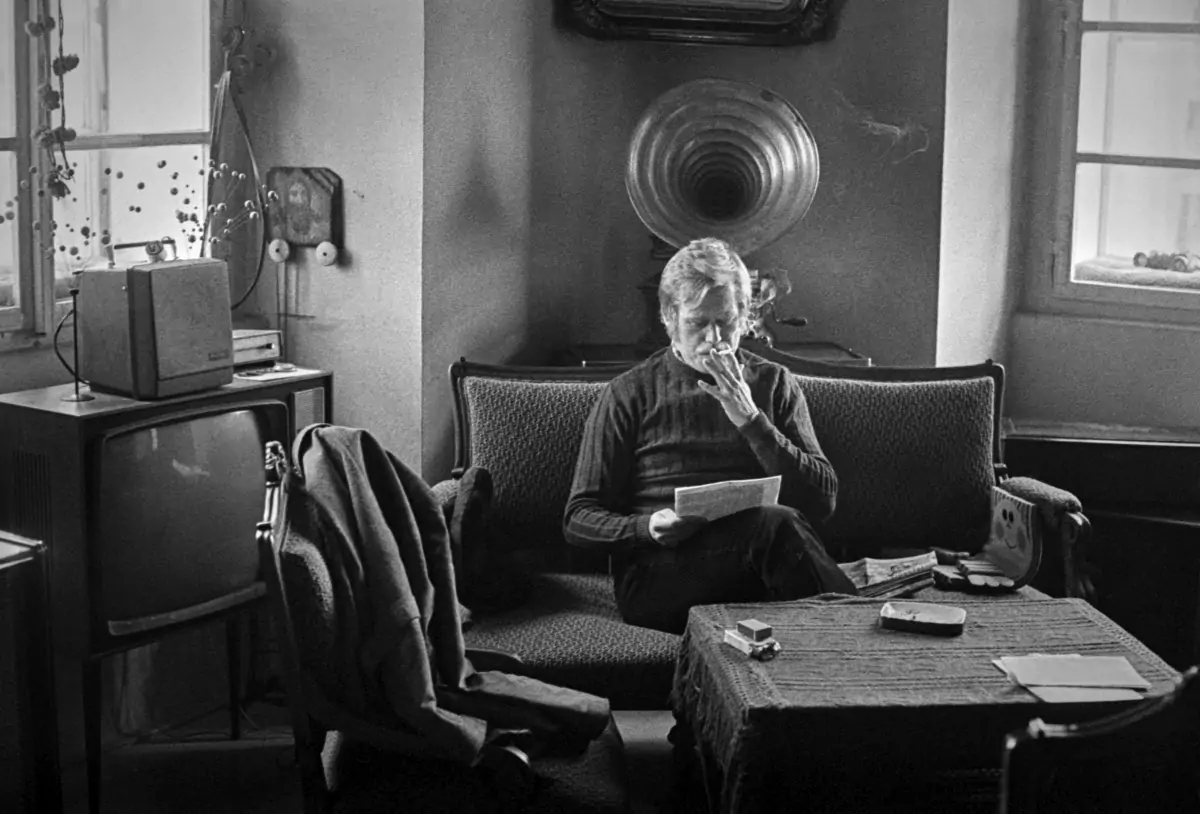
Club / News / Program
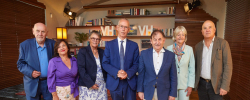
Three candidates shortlisted for the 2023 Václav Havel Prize 05/09/23
The selection panel of the Václav Havel Human Rights Prize, which rewards outstanding civil society action in defence of human rights in Europe and beyond, has today announced the shortlist for the 2023 Award. Meeting in Prague today, the panel – made up of independent figures from the world of human rights and chaired by the President of the Parliamentary Assembly of the Council of Europe (PACE) Tiny Kox – decided to shortlist the following three nominees, in alphabetical order: More
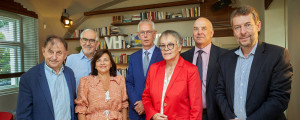
Three candidates shortlisted for the 2022 Václav Havel Human Rights Prize 06/09/22
The discussion among the seven-member jury helmed by the president of the Parliamentary Assembly of the Council of Europe centred on the importance of the issue of human rights during this tense period. The finalists include Vladimir Kara-Murza, a political prisoner and leading Russian democracy campaigner; Ukraine’s 5 AM Coalition, which gathers evidence of human rights abuses stemming from Russia’s invasion of the country; and Hungary’s Rainbow Coalition defending LGBTQIA+ rights. “This year’s selection reflects the central role that human rights play in the current European crisis,” says Michael Žantovský, jury member and executive director of the Václav Havel Library, which bestows the prize in cooperation with the Parliamentary Assembly of the Council of Europe and Nadace Charty 77.
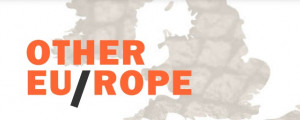
The Other Europe 27/04/22
Dear Friends, After three years we have completed the international project The Other Europe, during which, in cooperation with partner institutions, we have processed and made public recordings of interviews shot in 1987 and 1988 behind the Iron Curtain, and in exile, with important representatives of the opposition and the arts, as well as random citizens. Over those three years we have prepared video, audio and text of 106 interviews in speakers’ native languages and English translation. Despite public health restrictions in the Covid period, we have jointly prepared 16 international conferences and public presentations in six Central and Eastern European states. More
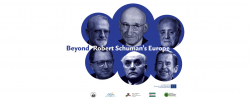
From Schuman to Havel – what next? 16/02/22
The Václav Havel Library is a proud partner of the project Beyond Robert Schuman’s Europe More
Program for February 2017<>
entry-free
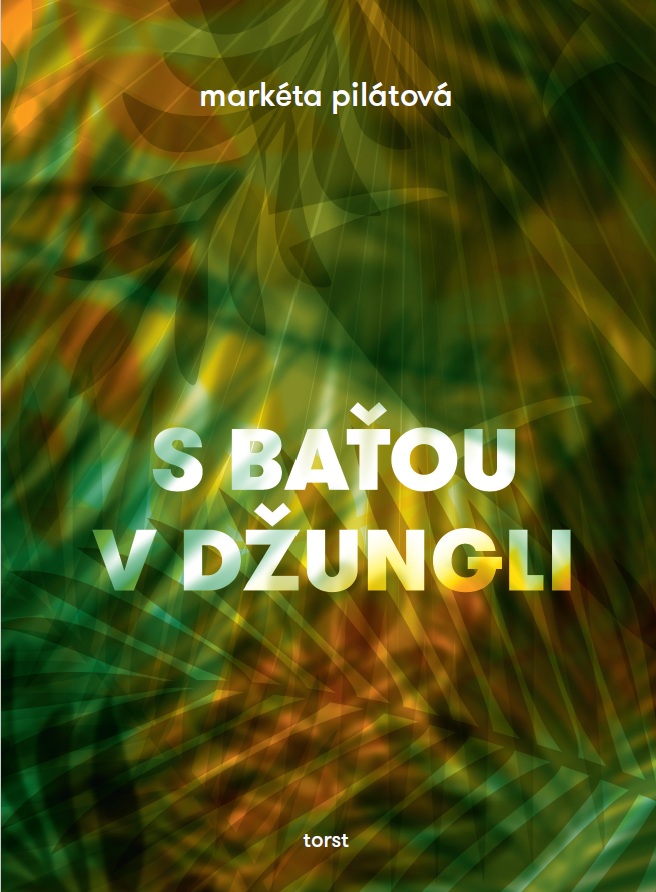
Markéta Pilátová: Czechs in the Jungle
- Where: Václav Havel Library, Ostrovní 13, Prague 110 00
- When: February 1, 2017, 17:00 – 19:00
While the Communists were building a dictatorship in the Czech lands, in the Brazilian jungle Jan Antonín Baťa was building new Zlíns. Markéta Pilátová’s novel S Baťou v džungli (In the Jungle with Baťa) recounts the little-known stories of Czech émigrés in South America. The narrator is Jan Antonín Baťa himself, who returns from the grave in order to tell his own story as it actually was, not as it was painted by Communist propaganda and historians. He doesn’t just recall his closest collaborators and advisors, such as Hugo Vavrečka, but even attends the funeral of Václav Havel. The ghost of Jan Antonín Baťa writes poetry and is unwilling to leave this world until he has found justice.
The author will be introduced by Jáchym Topol while the book will be “baptised” by Jan Antonín Baťa’s granddaughter Dolores Baťa Arambašič, without whose recollections and family archive the book could not have been written.
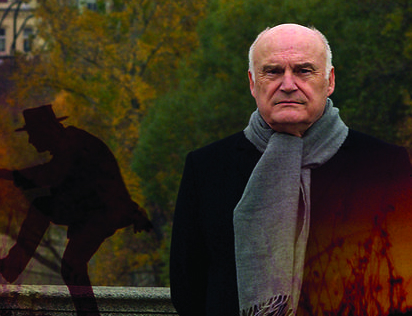
Rudolf Barta: The Hands of the Prison Clock
- Where: Václav Havel Library, Ostrovní 13, Prague 110 00
- When: February 2, 2017, 19:00 – 21:00
Rudolf Barta comes from a family that has produced a number of important entrepreneurs, inventors and scientists. He himself emigrated in 1968, first to Germany and later to the US. For him the attraction wasn’t career but the joy of living in the free world. After initially working for the British Army he later scraped along in a life of adventure or earned a living as a butler or trader… and along the way he encountered countless big names from the worlds of cinema, media and politics.
Rich with stories and with a clear undercurrent of blues poetry, Barta’s book Ručičky věžních hodin (The Hands of the Prison Clock) describes both periods of success and steep falls. It is not just a personal chronicle but a testament to the life of an entire generation.
Tomáš Vrba and Michael Žantovský will present the book and conduct a talk with the author.
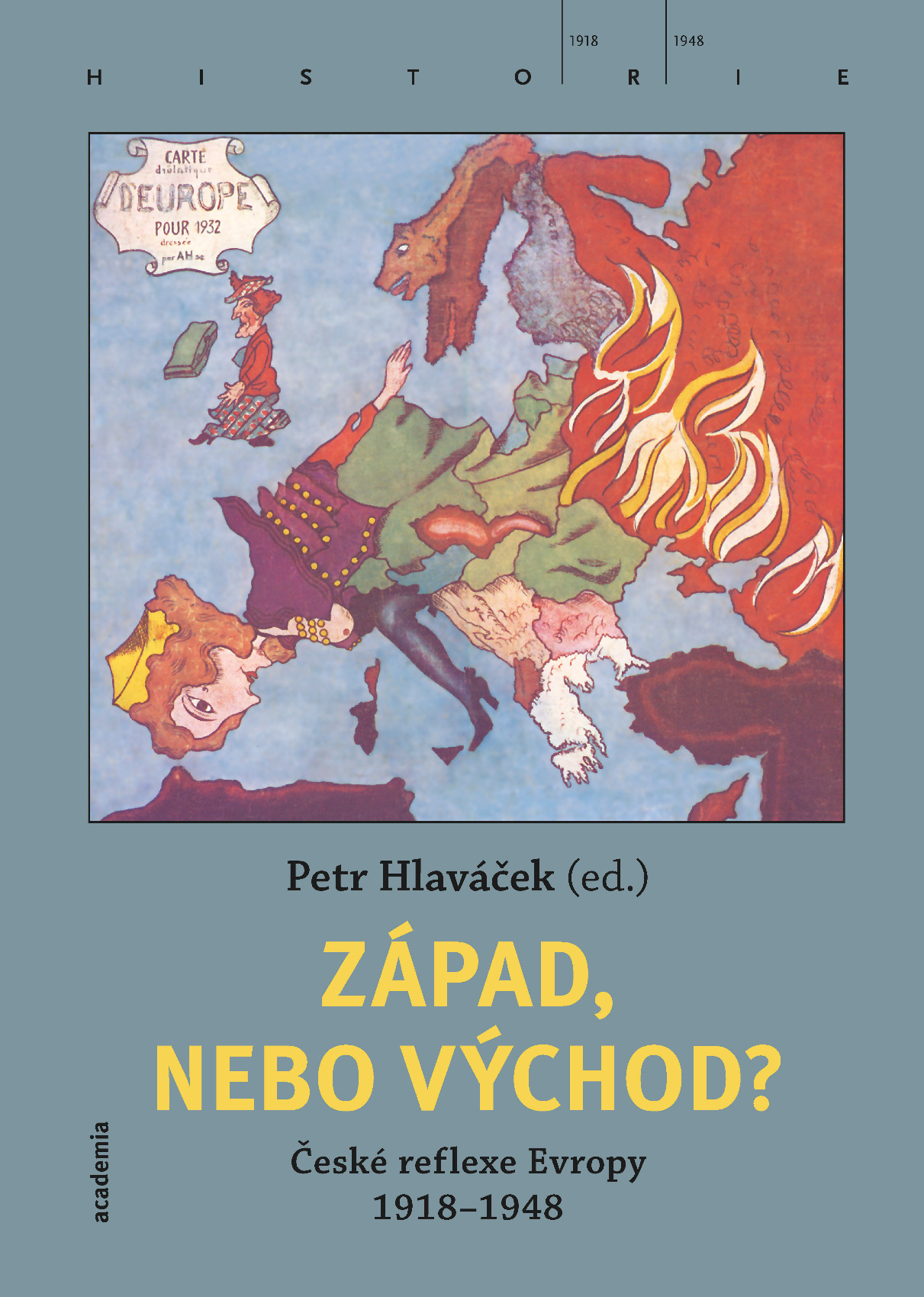
A Czech Divorce from the West?
- Where: Václav Havel Library, Ostrovní 13, Prague 110 00
- When: February 7, 2017, 19:00 – 21:00
“Europe is no longer the conductor of the global orchestra. But this does not mean it has played out its role and has nothing to say to the world any more.” (Václav Havel, Aachen, 1996)
For a millennium Czechs have helped shape the West, which is not a geographical entity but one of values, mentality and civilisation. However, since the start of the 19th century, when the modern Czech political nation began to emerge, we have gone through efforts to “divorce” from the West, against which we have defined ourselves to lesser or greater degrees, in a strange ultra-Slavonic intoxication. A geo-political divorce was enacted in the years 1945–1948, when we became part of the Soviet empire. After 1989 it appeared that this anti-Western and anti-European “divorce syndrome” had been surmounted. However, in recent years it has reared its head in Czech society once again. What are the roots of this phenomenon? And what role can it play in the volatile Western community of the end of the second decade of the 21st century?
Issues surrounding the Czech relationship with the West will be discussed by historian and philosopher Petr Hlaváček, author of the recently published Západ, nebo Východ? České reflexe Evropy 1918–1948 (West or East? Czech reflections on Europe, 1918–1948), political geographer Michael Romancov and journalist Kateřina Šafaříková, who covers current European issues.
Debate chaired by Michael Žantovský.
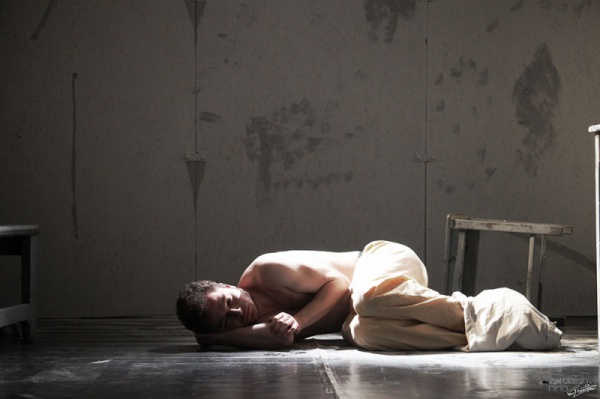
Perpetuum Mobile, or 7 Days of Mr. A
- Where: Václav Havel Library, Ostrovní 13, Prague 110 00
- When: February 8, 2017, 19:00 – 21:00
Václav Havel wrote the mime libretto Perpetuum Mobile aneb 7 Dní Pana A (Perpetuum Mobile, or 7 Days of Mr. A) while in custody in spring 1989. Despite its silent absurd grotesque stylisation, the piece reflects authentic aspects of prison life as well as following, in a heightened style, the cycle of hope and despair in the actions of an innocent prisoner.
A directorial note from the author – “Imagination knows no bounds!” – encouraged those staging the piece to render his libretto in a modern way. They were to strive for a new stylisation of movement, abandoning the artistic form of traditional mime and opting instead for an approach closer to everyday life.
The piece is the work of director Radim Vizváry and the mime Vojtěch Svoboda, actors and graduates of the Department of Mime at the Faculty of Music and Dance of the Academy of Performing Arts.
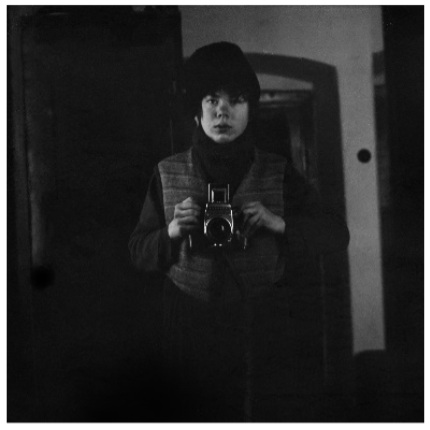
Libuše Jarcovjáková: The Black Years
- Where: Václav Havel Library, Ostrovní 13, Prague 110 00
- When: February 9, 2017, 19:00 – 21:00
Libuše Jarcovjáková, the enfant terrible of Czech photography, is publishing her work in book form for the first time. Černé roky (The Black Years) comprises raw photos and literary diaries from the period 1971–1987. The book distills the black and white ordinariness of normalisation Prague, revealing both the beauty and decay of that period, as well as providing an insight into the remarkable later life of an émigré in West Berlin and Tokyo.
Libuše Jarcovjáková lived in pubs, worked the night shift at a print factory, went through a host of lovers of both genders and took photographs in semi-legal gay clubs. She brazenly transcended the boundaries of social stereotypes and morals. The Black Years documents the 1970s and 1980s as people really lived them. And the things they were afraid to live. In her own idiosyncratic manner, Libuše tackled abortion committees, StB men and a complicated father, photographing it all and writing about it all.
The book will be presented by documentarian Barbora Baronová while curator Lucia L. Fišerová will host a talk with the author.
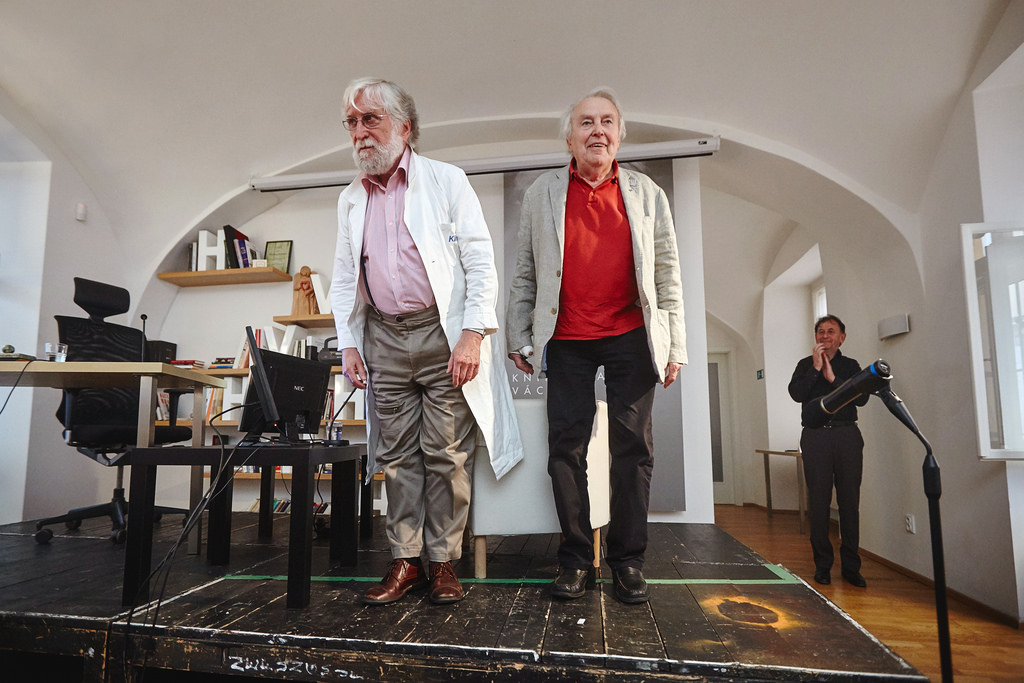
Rr at GASK
- Where: GASK, Barborská 24, Kutná Hora
- When: February 11, 2017, 18:00 – 20:00
A trrragicomedy about the desirrre of Rrrobert Chrrroust, who strrruggled to prrronounce his r’s, to become an actorrr. Authorrrs Pavel Kohout and Václav Havel completed the play in 1973 and it was perrrformed just once, at a meeting of the banned wrrriterrrs at Hrrrádeček the following yearrr. Afterrr yearrrs of silence, the Václav Havel Library decided to brrring it to life officially.
Doctorrr: Ivan M. Havel
Patient: Pavel Kohout
Dirrrectorrr: Michael Žantovský
For more inforrrmatoin go to http://gask.cz/en
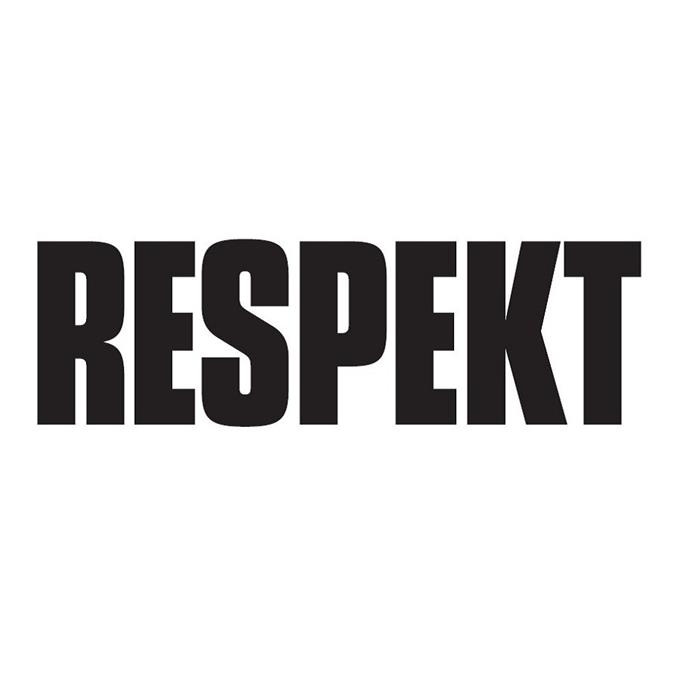
Debate with Respekt
- Where: Václav Havel Library, Ostrovní 13, Prague 110 00
- When: February 14, 2017, 19:00 – 21:00
Discussion with Respekt editors and their guests on a topical issue. More information will be posted at least one week before the event at www.vaclavhavel-library.org.
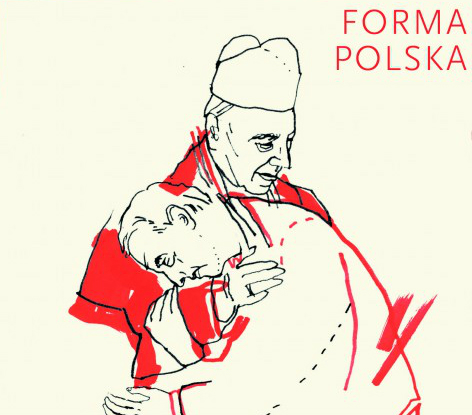
Religious People – What is Behind Polish Catholicism?
- Where: Václav Havel Library, Ostrovní 13, Prague 110 00
- When: February 16, 2017, 19:00 – 21:00
The label “society with a strong religious influence” ranks among the most common Czech perceptions of Poland. Viewing Poland through Catholicism has a long tradition here, dating back at least to Masaryk’s day. What is the source of this by European standards unique connection of national identity and religion, of the typical equation of “Pole” and “Catholic”?
These questions will be discussed by the two authors of the book Religious People, the philosopher and sociologist Paweł Rojek and the sociologist and psychologist Michał Łuczewski. The writers of the individual essays advance a surprising theory – that this robust and direct bond between “the nation and the church” is in fact something new in Polish history. It was created at the end of the 19th century and took root firmly during the communist period.
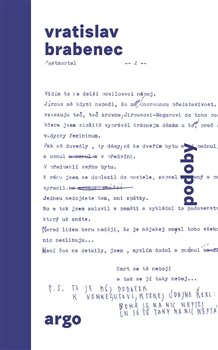
Vratislav Brabenec: Unsolicited Contribution
- Where: Václav Havel Library, Ostrovní 13, Prague 110 00
- When: February 20, 2017, 19:00 – 21:00
Meeting with Vratislav Brabenec, patriarch of the underground, poet, musician and signatory of Charter 77.
Brabence will read from his new prose collection Podoby (Forms), present the comics adventure Nevyžádaný příspěvek (Unsolicited Contribution) and play excerpts from several of his solo CDs.
The evening will be hosted by Vladimír “Lábus” Drápal from the label Guerilla Records.

Inequality in Education: Myth or Reality?
- Where: Václav Havel Library, Ostrovní 13, Prague 110 00
- When: February 21, 2017, 19:00 – 21:00
In international studies the Czech Republic ranks among countries where pupils’ and students’ results are closely tied to their socio-economic backgrounds. Does everybody in the Czech Republic have the same right to education and the same chance of succeeding in the education system? Is Czech education heading toward a deepening of inequality? Or is it instead gradually doing away with it?
Guests: Bob Kartous (EDUin), Lucie Plešková (Open Society Fund), Jana Straková (Charles University).
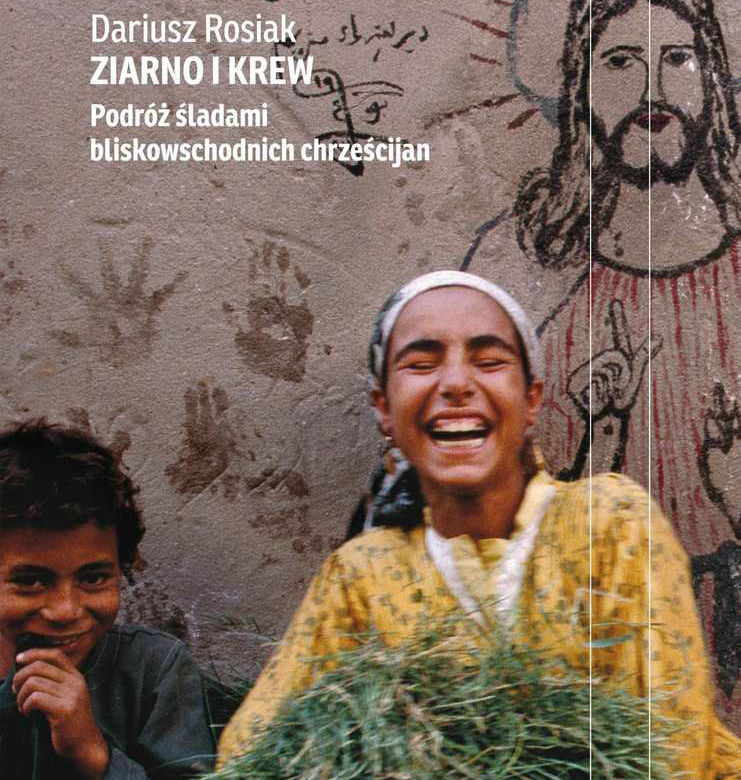
Evenings with Polish Reporters VII: Christians in the Middle East
- Where: Václav Havel Library, Ostrovní 13, Prague 110 00
- When: February 23, 2017, 19:00 – 21:00
Christianity was born in a region which we today refer to as the Middle East, one of the most volatile areas in the contemporary world. What is life like for people who profess the Christian faith in Iraq, Egypt, Turkey or Lebanon?
Polish Radio reporter Dariusz Rosiak visited those states and recorded hundreds of stories of people facing persecution, a fight to survive and expulsion from their homes. “On television and on YouTube we watch violence committed by Islamic State and then we, at best, organise charity auctions to salve our consciences. I didn’t want to become part of that or to become an armchair moralist. I decided to set out on a journey to try to describe a world that may be dying out,” the Polish journalist writes in his book Ziarno i krew. Podróż śladami bliskowschodnich chrześcijan (Grain and Blood: A Journey in the Footsteps of Middle Eastern Christians) (Czarne, 2015)
Dariusz Rosiak will speak with Czech Radio commentator Jan Fingerland, a leading Czech expert on the Middle East.
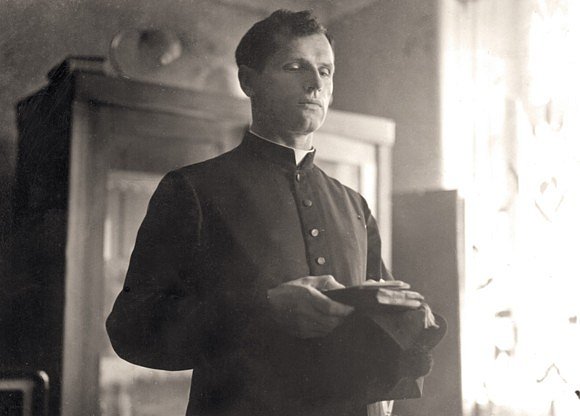
A Step into the Dark Night
- Where: Václav Havel Library, Ostrovní 13, Prague 110 00
- When: February 27, 2017, 19:00 – 21:00
Sixty-seven years ago, on 25 February 1950 the Číhošť parish priest Josef Toufar was murdered by StB officers. A story filled with disturbing questions and dramatic circumstances, in recent years it has returned as a compelling testimony. Who was Josef Toufar and who were his torturers? What can the Vysočina country priest tell today’s world? And what was president Gottwald’s role in that monstrous charade?
Miloš Doležal, the author of books focused on Toufar, Jana Franková and Jiří Hromada will read from new texts and documents, while Štěpán Drtina will provide musical accompaniment on cello.
Historian Tomáš Petráček will discuss the context and interpretations of the story.
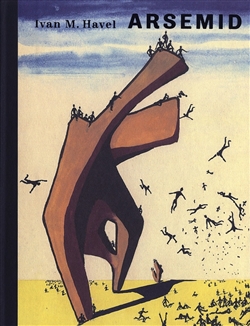
Arsemid
- Where: Václav Havel Library, Ostrovní 13, Prague 110 00
- When: February 28, 2017, 19:00 – 21:00
Ivan M. Havel wrote the novel Arsemid exactly 60 years ago, though it was only published in book form in the 1990s. Who is Arsemid? There is no clear answer, though we could do worse than search for one in the spiritual zone somewhere between Franz Kafka, J. R. R. Tolkien, Ladislav Klíma and Christian Morgenstern.
The author of the foreword Tomáš Vrba will present the third edition, which has been expanded to triple the length of the original.
Evening held in cooperation with the KANT publishing house.
Havel Channel
Havel Channel je audiovizuální projekt Knihovny Václava Havla, jehož cílem je šířit myšlenkový, literární a politický odkaz Václava Havla, bez ohledu na vzdálenost, zeměpisné hranice či nouzové stavy. Jeho páteř tvoří debaty, vzdělávací projekty a rozhovory. Velký prostor je věnován též konferencím, autorským čtením, záznamům divadelních inscenací a koncertům. Audiovizuální projekt Knihovny Václava Havla Havel Channel se uskutečňuje díky laskavé podpoře Karel Komárek Family Foundation.
Publications / E-shop
The central focus of the Library’s publishing programme is the life and work of Václav Havel, his family and close collaborators and friends. For clarity, the programme is divided into six series: Václav Havel Library Notebooks, Václav Havel Library Editions, Student Line, Talks from Lány, Václav Havel Documents, Works of Pavel Juráček and Václav Havel Library Conferences. Titles that cannot be incorporated into any of the given series but which are nonetheless important for the Library’s publishing activities are issued independently, outside the series framework.
Diary IV. 1974–1989
399,- CZK
Foolish Writing
299,- CZK
Havel to the Castle
149,- CZK
Kilián Nedory
199,- CZK
Case for a Novice Headsman
199,- CZK
I am not sad. Audience & Vernissage
129,- CZK
To the Castle and Back
249,- CZK
I am the Gypsy Baron
299,- CZK
Conferences & prizes
Václav Havel European Dialogues
The Václav Havel European Dialogues is an international project that aims to initiate and stimulate a discussion about issues determining the direction of contemporary Europe while referring to the European spiritual legacy of Václav Havel. This idea takes its main inspiration from Václav Havel’s essay “Power of the Powerless”. More than other similarly focused projects, the Václav Havel European Dialogues aims to offer the “powerless” a platform to express themselves and in so doing to boost their position within Europe.
The Václav Havel European Dialogues is planned as a long-term project and involves cooperation with other organisations in various European cities. Individual meetings, which take the form of a conference, are targeted primarily at secondary and third-level students, as well as specialists and members of the public interested in European issues.
Prague 2022Olomouc Prague 2023PragueMnichov 2020Brussels 2020Prague 2019Brussels 2019Prague 2018Brussels 2018Europe at the Crossroads (e-book)Prague 2017Brussels 2017Prague 2016Brussels 2016Prague 2015Brussels 2015Brussels 2014Berlin 2014Prague 2014 - J. GauckBruges 2014Prague 2014
Václav Havel Human Rights Prize
The Václav Havel Human Rights Prize is awarded each year by the Parliamentary Assembly of the Council of Europe (PACE) in partnership with the Václav Havel Library and the Charta 77 Foundation to reward outstanding civil society action in the defence of human rights in Europe and beyond.
11th Year of the Prize (2023)10th Year of the Prize (2022)9th Year of the Prize (2021)8th Year of the Prize (2020)7th Year of the Prize (2019)6th Year of the Prize (2018)5th Year of the Prize (2017)4th Year of the Prize (2016)3rd Year of the Prize (2015)2nd Year of the Prize (2014)1st Year of the Prize (2013)History of the prize
Havel - Albright Transatlantic Dialogues
Since the first Václav Havel Transatlantic Dialogues at GLOBSEC and FORUM 2000 conferences last year, we have lost another stalwart advocate of the transatlantic bond and of the need to face threats to democracy and international order together on both sides of the Atlantic, the former US Secretary of State Madeleine Albright. In view of the close bond between Václav Havel and Madeleine Albright and, after Havel's death, between the Secretary and the Library, the Václav Havel Library, with the approval of Madeleine Albright's family, renamed and rebranded the program as The Havel-Albright Transatlantic Dialogues (HATD), after the two major figures with roots in Central Europe who have personified the bond. Together, Václav Havel and Madeleine Albright symbolize the transatlantic relationship and the fundamental values underpinning it perhaps better than any other two people in recent history. The upcoming Dialogues “The Indispensable Woman: The Legacy of Madeleine K. Albright”, at the FORUM 2000 conference on September 1, and at the “Havel and our Crisis” conference at Colby College, ME, on September 28, will thus become venues for a well-deserved tribute to the pair we all respected and admired.
Transatlantic Dialogues 2021Transatlantic Dialogues 2022HATD 2022 Prague
Václav Havel
Václav Havel
* 5. 10. 1936 Praha
† 18. 12. 2011 Hrádeček u Trutnova
- spisovatel a dramatik, publicista a filozof
- jeden z trojice prvních mluvčích Charty 77
- vůdčí autorita československé společenské změny v listopadu 1989
- poslední prezident Československa a
- první prezident České republiky
- celoživotní zastánce lidských práv a svobod doma i ve světě.
Educational projects
Archive / Documentation centre / Research projects
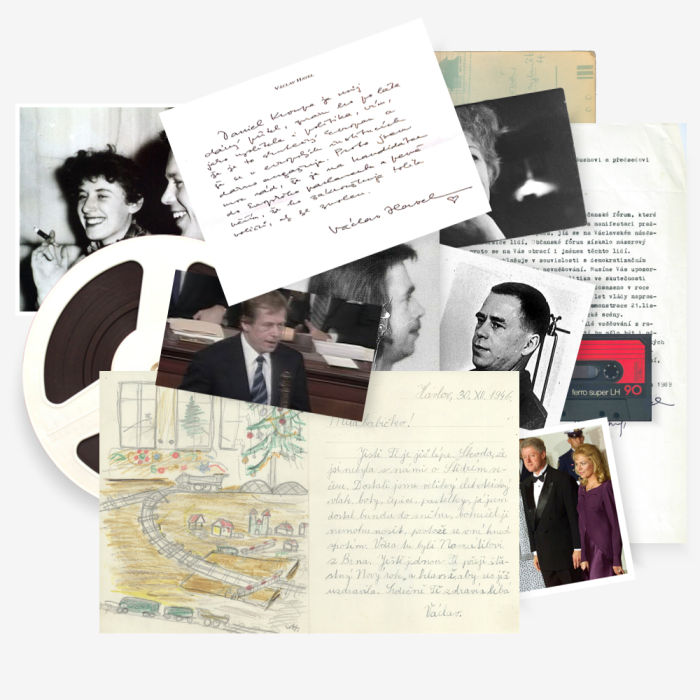
The Václav Havel Library is gradually gathering, digitizing, and making accessible written materials, photographs, sound recordings and other materials linked to the person of Václav Havel.
- 70807 records in total
- 27736 of events in the VH's life
- 2831 of VH's texts
- 2125 of photos
- 403of videos
- 568of audios
- 6604of letters
- 15101of texts about VH
- 8260 of books
- 40591of bibliography records
Access to the database of the VHL’s archives is free and possible after registering as a user. Accessing archival materials that exist in an unreadable form is only possible at the reading room of the Václav Havel Library, Ostrovní 13, 110 00 Prague 1, every Tuesday (except state holidays) from 9:00 to 17:00, or by prior appointment.
We will be glad to answer your queries at archiv@vaclavhavel-library.org.
Sign in (registered users only)
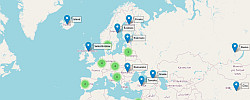
Havel in a nutshell
The virtual exhibition Václav Havel in a Nutshell places the life story of Václav Havel in the broader cultural and historic context in four chronologically distinct chapters with rich visual accompaniment. The exhibition is supplemented by the interactive map Flying the World with Václav Havel, which captures in physical form Havel’s global “footprint”.
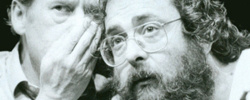
Vladimir Hanzel's revolution
Collage of recollections, images and sound recordings from Vladimír Hanzel, President Václav Havel’s personal secretary, bringing the feverish atmosphere of the Velvet Revolution to life.
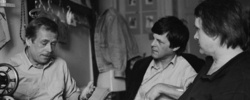
Václav Havel Interviews
A database of all accessible interviews given to print media outlets by the dramatist, writer and political activist Václav Havel between the 1960s and 1989. The resulting collection documents the extraordinary life story of an individual, as well as capturing a specific picture of modern Czechoslovak history at a time when being a free-thinker was more likely to lead to jail than an official public post.
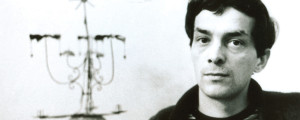
Pavel Juráček Archive
The Pavel Juráček Archive arose in February 2014 when his son Marek Juráček handed over six banana boxes and a typewriter case from his father’s estate to the Václav Havel Library. Thousands of pages of manuscripts, typescripts, photographs, documents and personal and official correspondence are gradually being classified and digitalised. The result of this work should be not only to map the life and work of one of the key figures of the New Wave of Czechoslovak film in the 1960s, but also to make his literary works accessible in the book series The Works of Pavel Juráček.
The aim of the Václav Havel Library is to ensure that Pavel Juráček finds a place in the broader cultural consciousness and to notionally build on the deep friendship he shared with Václav Havel. Soon after Juráček’s death in 1989 Havel said of him: “Pavel was a friend of mine whom I liked very much. He was one of the most sensitive and gentle people I have known – that’s why I cannot write more about him.”
All about Library
The Václav Havel Library works to preserve the legacy of Václav Havel, literary, theatrical and also political, in particular his struggle for freedom, democracy and the defence of human rights. It supports research and education on the life, values and times of Václav Havel as well as the enduring significance of his ideas for both the present and future.
The Václav Havel Library also strives to develop civil society and active civic life, serving as a platform for discussion on issues related to the support and defence of liberty and democracy, both in the Czech Republic and internationally.
The main aims of the Václav Havel Library include
- Organizing archival, archival-research, documentary, museum and library activities focused on the work of Vaclav Havel and documents or objects related to his activities, and carries out professional analysis of their influence on the life and self-reflection of society
- Serving, in a suitable manner, such as through exhibitions, the purpose of education and popularisation functions, thus presenting to the public the historical significance of the fight for human rights and freedoms in the totalitarian period and the formation of civil society during the establishment of democracy
- Organizing scientific research and publication activities in its areas of interest
Podpořte nás
We are well aware that freedom and democracy must be nurtured. Here at Ostrovní 13, but also on the audiovisual platform Havel Channel, we strive to do so through our own educational programmes, talks, discussion meetings, books, exhibitions, concerts, theatre performances. We honour Václav Havel's legacy and wish that the Library be a living organism and open to all. That is why our programme is free of charge for everyone. This would not be possible without regular financial support from our supporters. Become one of them...
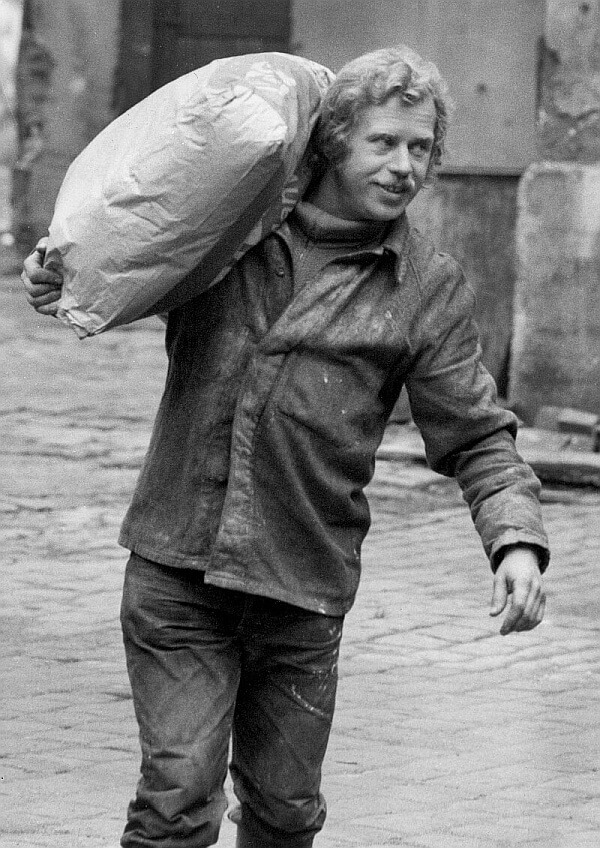
Support us with a financial donation
Does our work make sense to you and do you want to support the activities of the Vaclav Havel Library?
You can easily make a one-time payment by scanning the QR code.
Would you like to contribute regularly? Then we invite you to become a member of the Friends of the Vaclav Havel Library Club. What are the benefits of membership? Find out more.
Help us expand the archive
The Vaclav Havel Library manages an archive of writings, documents, photographs, video recordings and other materials related to the life and work of Vaclav Havel. This archive is predominantly in digital form. If you or someone close to you owns any original texts, correspondence, photographs, speeches or any other work by Vaclav Havel, we would be grateful if you could contact us.
You can donate in other ways too
Supporting a specific charitable or public benefit organization whose activities you appreciate or have been supporting for a long time is also possible through a will. This form of donation is quite common abroad, but in the Czech Republic this tradition is only just taking root.
Share information about us
The Vaclav Havel Library is open to media and promotional cooperation, mutual sharing of links, publishing our banners or information about our events.
For more information, please contact us.
Donations have their rules
At the Vaclav Havel Library, we uphold a transparent, responsible and ethical way of dealing with all those who contribute to fulfilling our purpose and implementing our strategy. Our code of ethics summarizes the basic rules of donations.
Get involved in volunteering
Would you like to get involved as a volunteer? That's great. We welcome anyone who wants to help our work.








